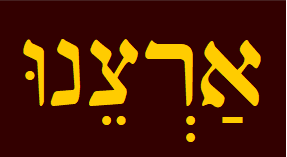Showing posts with label Artzeinu. Show all posts
Showing posts with label Artzeinu. Show all posts
Thursday, March 30, 2023
 Thursday, March 30, 2023
Thursday, March 30, 2023 Elder of Ziyon
Elder of Ziyon Artzeinu, Hebrew, indigenous, Jewish prayer, Land of Israel, Mishna, our land, Psalms
Artzeinu, Hebrew, indigenous, Jewish prayer, Land of Israel, Mishna, our land, Psalms
Anti-Zionists like to claim that Jews have no right to Israel because they were absent from the land for so long, and therefore the rights have been extinguished over time.
The proof they are wrong, of course, is that Jews have always maintained our emotional attachment to the Land of Israel. Our absence from the land was forced upon us and not a choice. The most famous example is the phrase at the end of the Passover seder and at the end of Yom Kippur services, "Next Year in Jerusalem!"
And, of course, every day, Jews in their prayers ask God to restore us to the Land and rebuild the Temple.
However, that argument has a flaw. Those examples may prove only that Jews want the Messiah to arrive and then return to the land of our forefathers. But what abut the ongoing attachment to the land in the two thousand years of diaspora? How can the ties that each Jew has in each generation, not a theoretical future, be proven?
This attachment can be proven by a single Hebrew word, and that word is אַרְצֵֽנו.
"Artzeinu" means "our land. " It is used about a half dozen times in the Hebrew scriptures, but the use of the word multiplied after our exile began.
Almost invariably, the term "our land" in Jewish literature refers to the Land of Israel - and no other.
The Sefaria database of Jewish texts finds אַרְצֵֽנו is used scores of times in the Talmud, 145 times in the Medrash, dozens of times in Jewish liturgy and hundreds of times in Jewish legal texts. And the passage of time does not lessen the use of the word - on the contrary, it can be found in texts written in the 19th and 20th centuries as well, by scholars who were not Zionist at the time.
From Psalms: "The LORD also bestows His bounty; our land yields its produce."
To the Mishna: "One who sees a place from which idolatry was eradicated recites: Blessed…Who eradicated idolatry from our land."
To the Talmud:"Rav Ḥisda said to Rav Yitzḥak: This balsam oil, what blessing does one recite over it? Rav Yitzḥak said to him, this is what Rav Yehuda said: One recites: Who creates the oil of our land, as balsam only grew in Eretz Yisrael, in the Jordan valley."
To the Grace After Meals: "May the All-merciful break the yoke from off our neck, and lead us upright to our land."
To Maimonides: "It is forbidden to sell [non-Jews] homes and fields in Eretz Yisrael....It is permitted to sell them houses and fields in the Diaspora, because it is not our land."
To the Chofetz Chaim (early 20th century) saying that the sin of loshon hora, speaking negatively about others, is "so severe as to have caused us to be exiled from our land!"
And on and on, through commentaries, works of philosophy, and responsa literature.
There is no need to qualify the term to say "our land of Israel" or to give it any other name. The phrase "our land" needs no explanation to the Jewish people that read these texts. Everyone knows what "artzeinu" refers to. No one would think for a second that "our land" refers to Babylonia or Egypt or Poland or Lithuania or anywhere else the authors and writers lived.
No matter how far we moved away, how much we were dispersed, how bleak the future looked, Jews always knew that there was a land - and only one land - that is ours.
And this one word, used in so many ways by Jews throughout history but always with the same meaning, proves it.
Subscribe to:
Comments (Atom)

 Elder of Ziyon
Elder of Ziyon



















.jpg)




